Strategic Planning Report: Maybourne Hotel Group Analysis
VerifiedAdded on 2020/10/22
|10
|2975
|500
Report
AI Summary
This report provides a strategic planning analysis for the hospitality industry, focusing on the Maybourne Hotel Group. It begins by outlining the key factors to consider when formulating strategic plans, including communication, innovation, stakeholder identification, and competitor analysis. The report then conducts an organizational audit using a SWOT analysis to assess the company's strengths, weaknesses, opportunities, and threats. An environmental audit, including a PESTLE analysis, is also conducted to examine the external factors impacting the firm. The report concludes with an examination of Maybourne's mission, vision, values, and structure. The analysis provides insights into the strategic positioning of the Maybourne Hotel Group and the development of strategic plans within the hospitality sector.
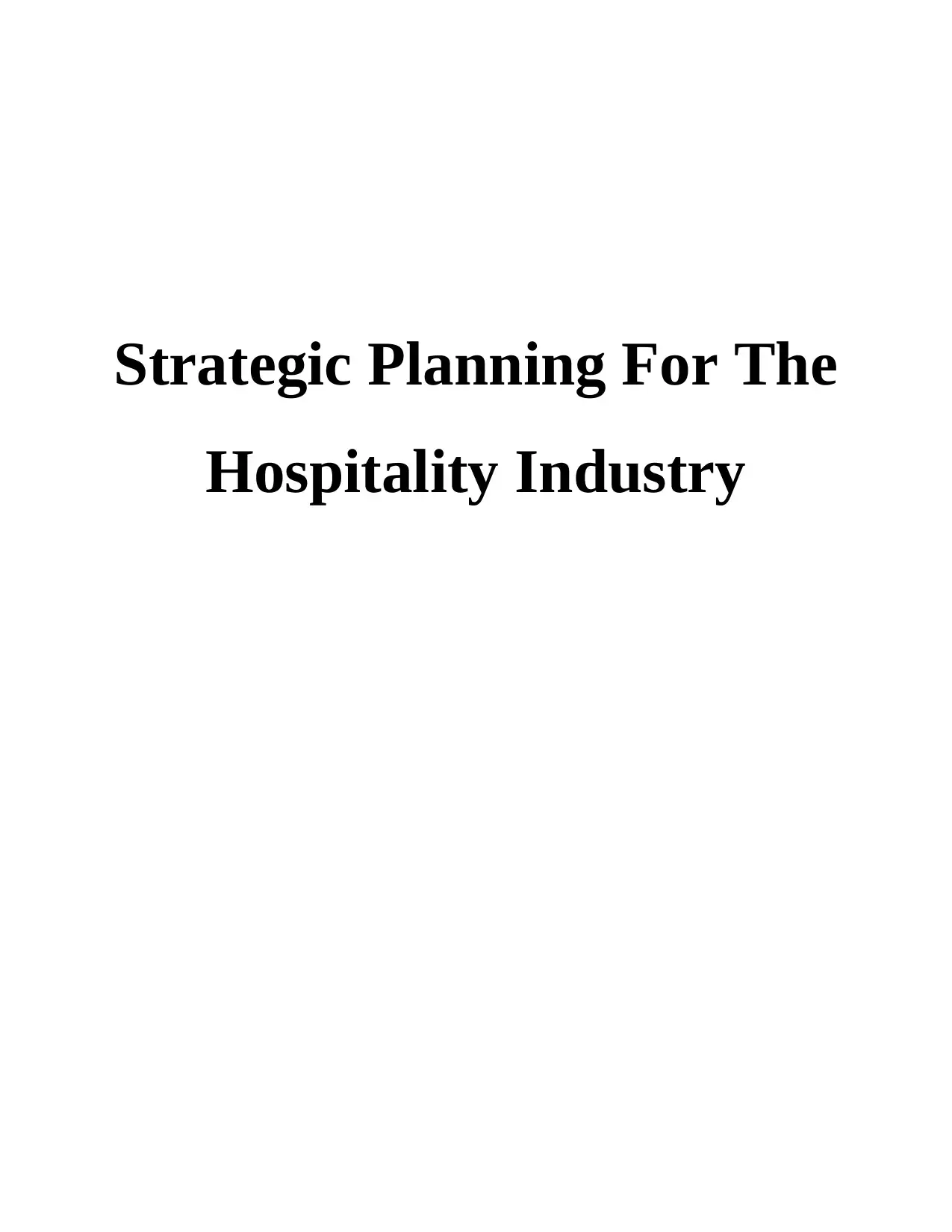
Strategic Planning For The
Hospitality Industry
Hospitality Industry
Paraphrase This Document
Need a fresh take? Get an instant paraphrase of this document with our AI Paraphraser
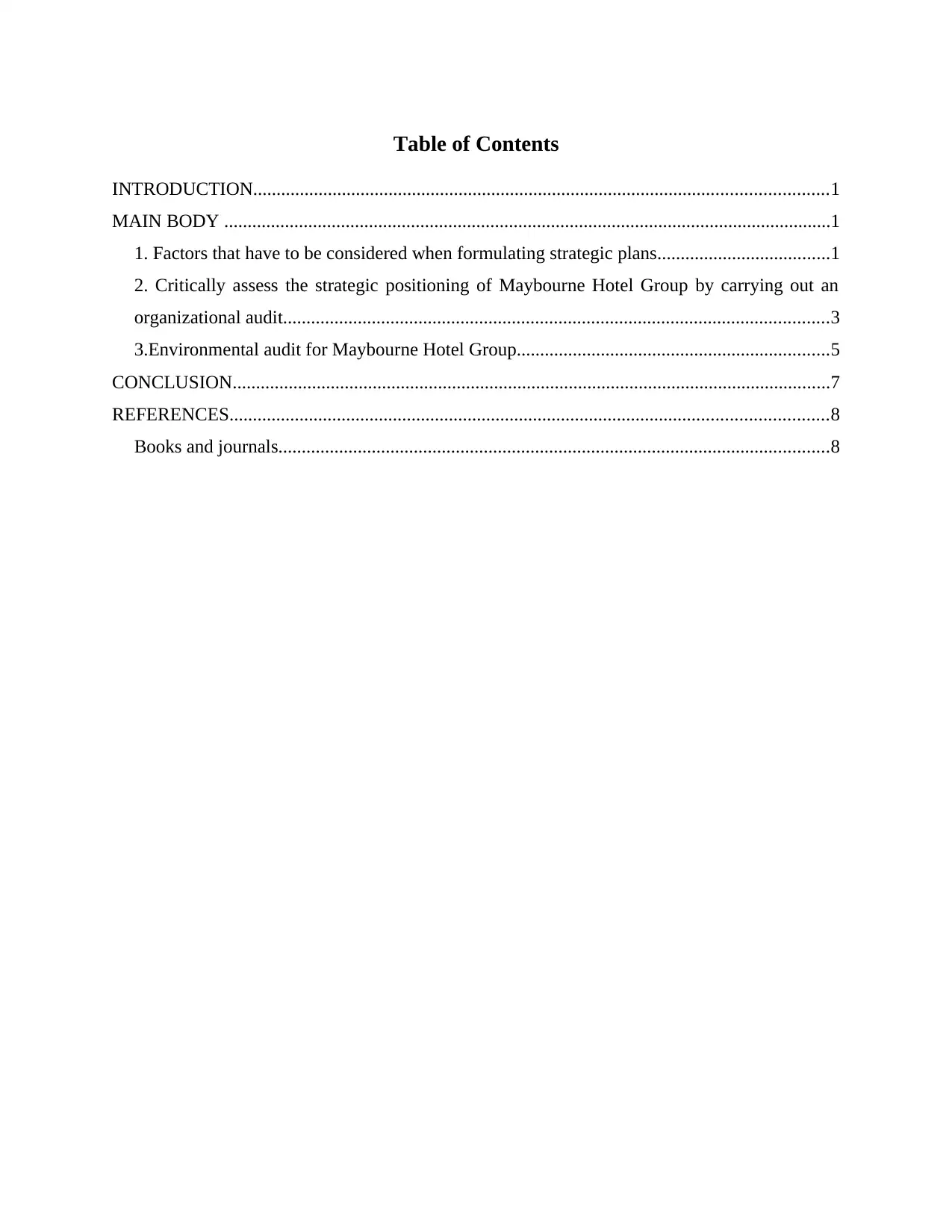
Table of Contents
INTRODUCTION...........................................................................................................................1
MAIN BODY ..................................................................................................................................1
1. Factors that have to be considered when formulating strategic plans.....................................1
2. Critically assess the strategic positioning of Maybourne Hotel Group by carrying out an
organizational audit.....................................................................................................................3
3.Environmental audit for Maybourne Hotel Group...................................................................5
CONCLUSION................................................................................................................................7
REFERENCES................................................................................................................................8
Books and journals......................................................................................................................8
INTRODUCTION...........................................................................................................................1
MAIN BODY ..................................................................................................................................1
1. Factors that have to be considered when formulating strategic plans.....................................1
2. Critically assess the strategic positioning of Maybourne Hotel Group by carrying out an
organizational audit.....................................................................................................................3
3.Environmental audit for Maybourne Hotel Group...................................................................5
CONCLUSION................................................................................................................................7
REFERENCES................................................................................................................................8
Books and journals......................................................................................................................8
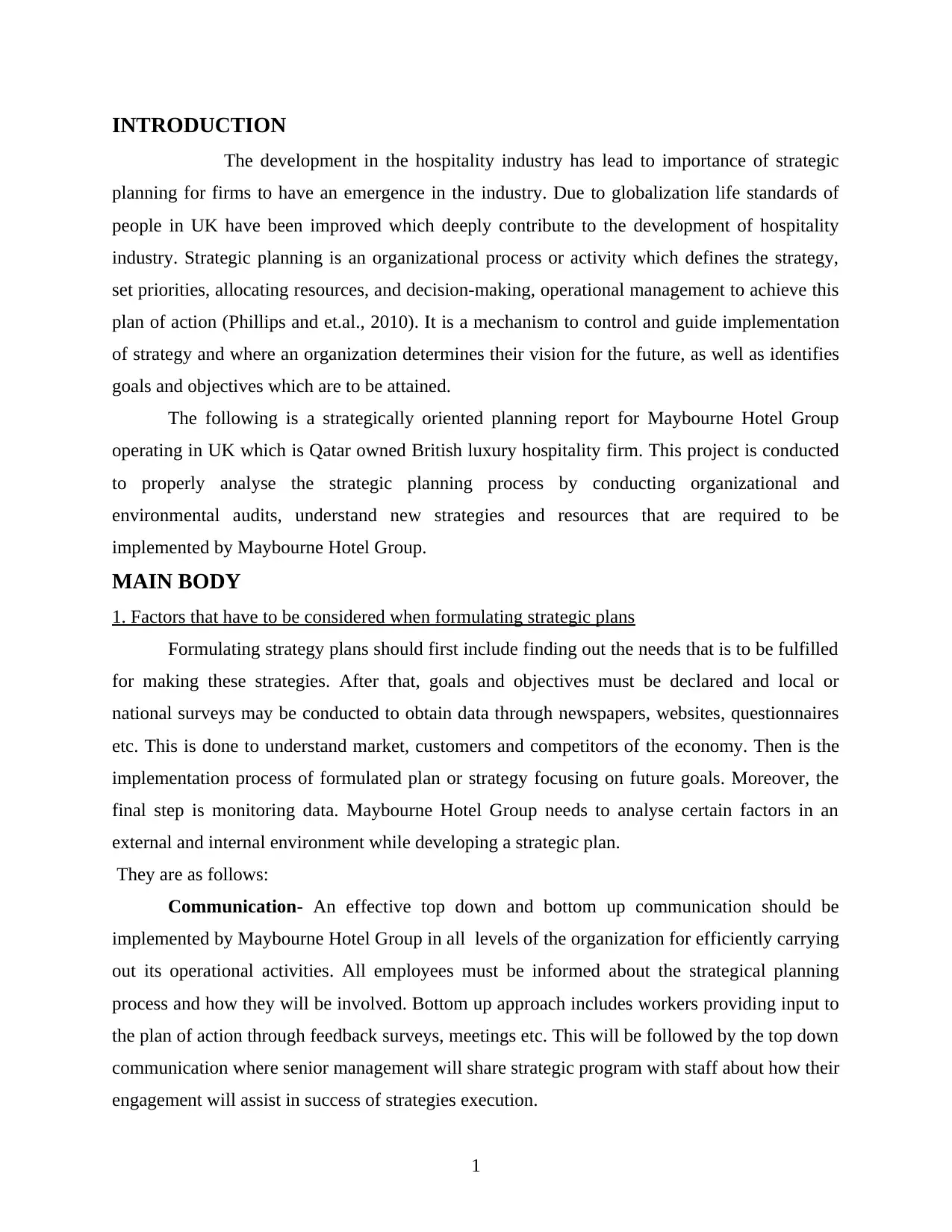
INTRODUCTION
The development in the hospitality industry has lead to importance of strategic
planning for firms to have an emergence in the industry. Due to globalization life standards of
people in UK have been improved which deeply contribute to the development of hospitality
industry. Strategic planning is an organizational process or activity which defines the strategy,
set priorities, allocating resources, and decision-making, operational management to achieve this
plan of action (Phillips and et.al., 2010). It is a mechanism to control and guide implementation
of strategy and where an organization determines their vision for the future, as well as identifies
goals and objectives which are to be attained.
The following is a strategically oriented planning report for Maybourne Hotel Group
operating in UK which is Qatar owned British luxury hospitality firm. This project is conducted
to properly analyse the strategic planning process by conducting organizational and
environmental audits, understand new strategies and resources that are required to be
implemented by Maybourne Hotel Group.
MAIN BODY
1. Factors that have to be considered when formulating strategic plans
Formulating strategy plans should first include finding out the needs that is to be fulfilled
for making these strategies. After that, goals and objectives must be declared and local or
national surveys may be conducted to obtain data through newspapers, websites, questionnaires
etc. This is done to understand market, customers and competitors of the economy. Then is the
implementation process of formulated plan or strategy focusing on future goals. Moreover, the
final step is monitoring data. Maybourne Hotel Group needs to analyse certain factors in an
external and internal environment while developing a strategic plan.
They are as follows:
Communication- An effective top down and bottom up communication should be
implemented by Maybourne Hotel Group in all levels of the organization for efficiently carrying
out its operational activities. All employees must be informed about the strategical planning
process and how they will be involved. Bottom up approach includes workers providing input to
the plan of action through feedback surveys, meetings etc. This will be followed by the top down
communication where senior management will share strategic program with staff about how their
engagement will assist in success of strategies execution.
1
The development in the hospitality industry has lead to importance of strategic
planning for firms to have an emergence in the industry. Due to globalization life standards of
people in UK have been improved which deeply contribute to the development of hospitality
industry. Strategic planning is an organizational process or activity which defines the strategy,
set priorities, allocating resources, and decision-making, operational management to achieve this
plan of action (Phillips and et.al., 2010). It is a mechanism to control and guide implementation
of strategy and where an organization determines their vision for the future, as well as identifies
goals and objectives which are to be attained.
The following is a strategically oriented planning report for Maybourne Hotel Group
operating in UK which is Qatar owned British luxury hospitality firm. This project is conducted
to properly analyse the strategic planning process by conducting organizational and
environmental audits, understand new strategies and resources that are required to be
implemented by Maybourne Hotel Group.
MAIN BODY
1. Factors that have to be considered when formulating strategic plans
Formulating strategy plans should first include finding out the needs that is to be fulfilled
for making these strategies. After that, goals and objectives must be declared and local or
national surveys may be conducted to obtain data through newspapers, websites, questionnaires
etc. This is done to understand market, customers and competitors of the economy. Then is the
implementation process of formulated plan or strategy focusing on future goals. Moreover, the
final step is monitoring data. Maybourne Hotel Group needs to analyse certain factors in an
external and internal environment while developing a strategic plan.
They are as follows:
Communication- An effective top down and bottom up communication should be
implemented by Maybourne Hotel Group in all levels of the organization for efficiently carrying
out its operational activities. All employees must be informed about the strategical planning
process and how they will be involved. Bottom up approach includes workers providing input to
the plan of action through feedback surveys, meetings etc. This will be followed by the top down
communication where senior management will share strategic program with staff about how their
engagement will assist in success of strategies execution.
1
⊘ This is a preview!⊘
Do you want full access?
Subscribe today to unlock all pages.

Trusted by 1+ million students worldwide
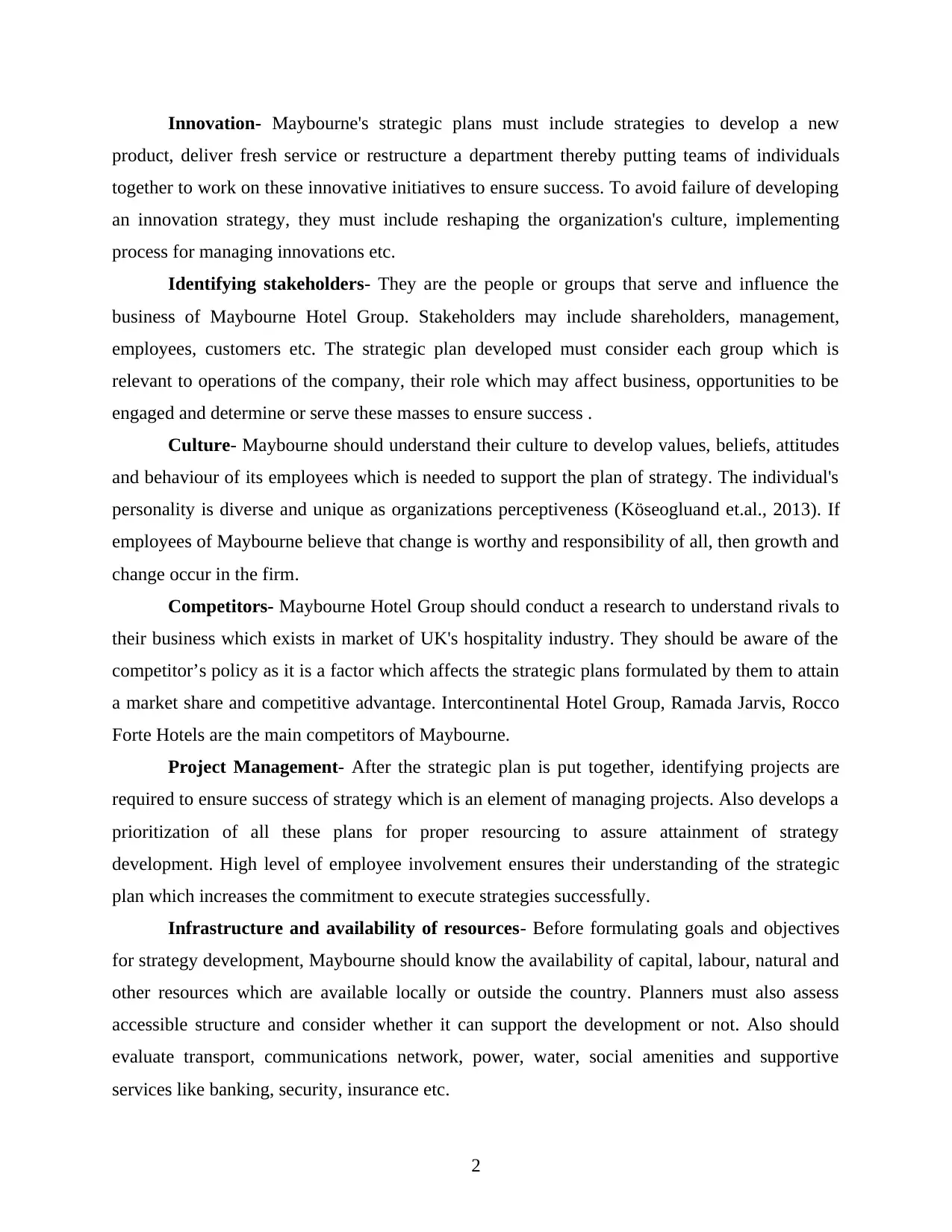
Innovation- Maybourne's strategic plans must include strategies to develop a new
product, deliver fresh service or restructure a department thereby putting teams of individuals
together to work on these innovative initiatives to ensure success. To avoid failure of developing
an innovation strategy, they must include reshaping the organization's culture, implementing
process for managing innovations etc.
Identifying stakeholders- They are the people or groups that serve and influence the
business of Maybourne Hotel Group. Stakeholders may include shareholders, management,
employees, customers etc. The strategic plan developed must consider each group which is
relevant to operations of the company, their role which may affect business, opportunities to be
engaged and determine or serve these masses to ensure success .
Culture- Maybourne should understand their culture to develop values, beliefs, attitudes
and behaviour of its employees which is needed to support the plan of strategy. The individual's
personality is diverse and unique as organizations perceptiveness (Köseogluand et.al., 2013). If
employees of Maybourne believe that change is worthy and responsibility of all, then growth and
change occur in the firm.
Competitors- Maybourne Hotel Group should conduct a research to understand rivals to
their business which exists in market of UK's hospitality industry. They should be aware of the
competitor’s policy as it is a factor which affects the strategic plans formulated by them to attain
a market share and competitive advantage. Intercontinental Hotel Group, Ramada Jarvis, Rocco
Forte Hotels are the main competitors of Maybourne.
Project Management- After the strategic plan is put together, identifying projects are
required to ensure success of strategy which is an element of managing projects. Also develops a
prioritization of all these plans for proper resourcing to assure attainment of strategy
development. High level of employee involvement ensures their understanding of the strategic
plan which increases the commitment to execute strategies successfully.
Infrastructure and availability of resources- Before formulating goals and objectives
for strategy development, Maybourne should know the availability of capital, labour, natural and
other resources which are available locally or outside the country. Planners must also assess
accessible structure and consider whether it can support the development or not. Also should
evaluate transport, communications network, power, water, social amenities and supportive
services like banking, security, insurance etc.
2
product, deliver fresh service or restructure a department thereby putting teams of individuals
together to work on these innovative initiatives to ensure success. To avoid failure of developing
an innovation strategy, they must include reshaping the organization's culture, implementing
process for managing innovations etc.
Identifying stakeholders- They are the people or groups that serve and influence the
business of Maybourne Hotel Group. Stakeholders may include shareholders, management,
employees, customers etc. The strategic plan developed must consider each group which is
relevant to operations of the company, their role which may affect business, opportunities to be
engaged and determine or serve these masses to ensure success .
Culture- Maybourne should understand their culture to develop values, beliefs, attitudes
and behaviour of its employees which is needed to support the plan of strategy. The individual's
personality is diverse and unique as organizations perceptiveness (Köseogluand et.al., 2013). If
employees of Maybourne believe that change is worthy and responsibility of all, then growth and
change occur in the firm.
Competitors- Maybourne Hotel Group should conduct a research to understand rivals to
their business which exists in market of UK's hospitality industry. They should be aware of the
competitor’s policy as it is a factor which affects the strategic plans formulated by them to attain
a market share and competitive advantage. Intercontinental Hotel Group, Ramada Jarvis, Rocco
Forte Hotels are the main competitors of Maybourne.
Project Management- After the strategic plan is put together, identifying projects are
required to ensure success of strategy which is an element of managing projects. Also develops a
prioritization of all these plans for proper resourcing to assure attainment of strategy
development. High level of employee involvement ensures their understanding of the strategic
plan which increases the commitment to execute strategies successfully.
Infrastructure and availability of resources- Before formulating goals and objectives
for strategy development, Maybourne should know the availability of capital, labour, natural and
other resources which are available locally or outside the country. Planners must also assess
accessible structure and consider whether it can support the development or not. Also should
evaluate transport, communications network, power, water, social amenities and supportive
services like banking, security, insurance etc.
2
Paraphrase This Document
Need a fresh take? Get an instant paraphrase of this document with our AI Paraphraser
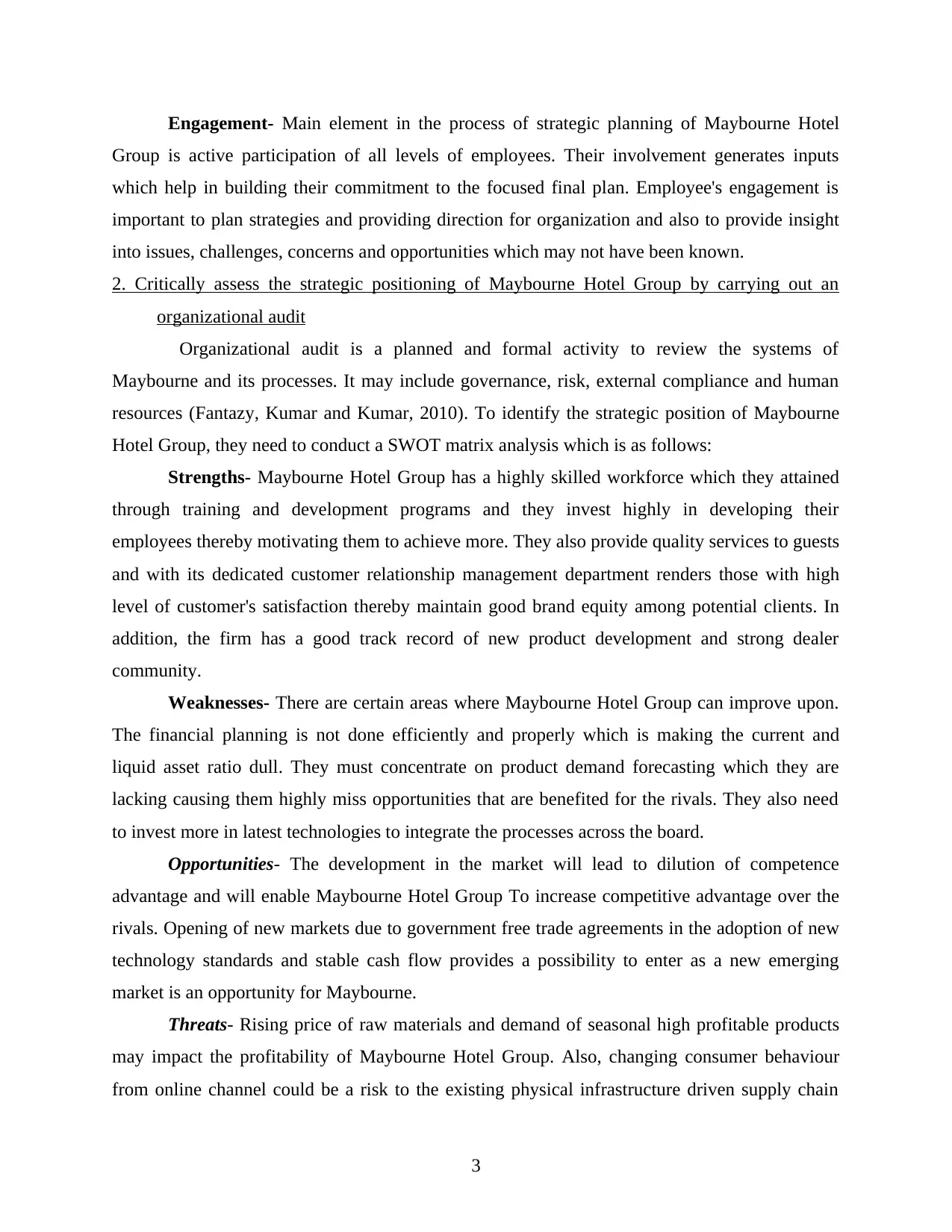
Engagement- Main element in the process of strategic planning of Maybourne Hotel
Group is active participation of all levels of employees. Their involvement generates inputs
which help in building their commitment to the focused final plan. Employee's engagement is
important to plan strategies and providing direction for organization and also to provide insight
into issues, challenges, concerns and opportunities which may not have been known.
2. Critically assess the strategic positioning of Maybourne Hotel Group by carrying out an
organizational audit
Organizational audit is a planned and formal activity to review the systems of
Maybourne and its processes. It may include governance, risk, external compliance and human
resources (Fantazy, Kumar and Kumar, 2010). To identify the strategic position of Maybourne
Hotel Group, they need to conduct a SWOT matrix analysis which is as follows:
Strengths- Maybourne Hotel Group has a highly skilled workforce which they attained
through training and development programs and they invest highly in developing their
employees thereby motivating them to achieve more. They also provide quality services to guests
and with its dedicated customer relationship management department renders those with high
level of customer's satisfaction thereby maintain good brand equity among potential clients. In
addition, the firm has a good track record of new product development and strong dealer
community.
Weaknesses- There are certain areas where Maybourne Hotel Group can improve upon.
The financial planning is not done efficiently and properly which is making the current and
liquid asset ratio dull. They must concentrate on product demand forecasting which they are
lacking causing them highly miss opportunities that are benefited for the rivals. They also need
to invest more in latest technologies to integrate the processes across the board.
Opportunities- The development in the market will lead to dilution of competence
advantage and will enable Maybourne Hotel Group To increase competitive advantage over the
rivals. Opening of new markets due to government free trade agreements in the adoption of new
technology standards and stable cash flow provides a possibility to enter as a new emerging
market is an opportunity for Maybourne.
Threats- Rising price of raw materials and demand of seasonal high profitable products
may impact the profitability of Maybourne Hotel Group. Also, changing consumer behaviour
from online channel could be a risk to the existing physical infrastructure driven supply chain
3
Group is active participation of all levels of employees. Their involvement generates inputs
which help in building their commitment to the focused final plan. Employee's engagement is
important to plan strategies and providing direction for organization and also to provide insight
into issues, challenges, concerns and opportunities which may not have been known.
2. Critically assess the strategic positioning of Maybourne Hotel Group by carrying out an
organizational audit
Organizational audit is a planned and formal activity to review the systems of
Maybourne and its processes. It may include governance, risk, external compliance and human
resources (Fantazy, Kumar and Kumar, 2010). To identify the strategic position of Maybourne
Hotel Group, they need to conduct a SWOT matrix analysis which is as follows:
Strengths- Maybourne Hotel Group has a highly skilled workforce which they attained
through training and development programs and they invest highly in developing their
employees thereby motivating them to achieve more. They also provide quality services to guests
and with its dedicated customer relationship management department renders those with high
level of customer's satisfaction thereby maintain good brand equity among potential clients. In
addition, the firm has a good track record of new product development and strong dealer
community.
Weaknesses- There are certain areas where Maybourne Hotel Group can improve upon.
The financial planning is not done efficiently and properly which is making the current and
liquid asset ratio dull. They must concentrate on product demand forecasting which they are
lacking causing them highly miss opportunities that are benefited for the rivals. They also need
to invest more in latest technologies to integrate the processes across the board.
Opportunities- The development in the market will lead to dilution of competence
advantage and will enable Maybourne Hotel Group To increase competitive advantage over the
rivals. Opening of new markets due to government free trade agreements in the adoption of new
technology standards and stable cash flow provides a possibility to enter as a new emerging
market is an opportunity for Maybourne.
Threats- Rising price of raw materials and demand of seasonal high profitable products
may impact the profitability of Maybourne Hotel Group. Also, changing consumer behaviour
from online channel could be a risk to the existing physical infrastructure driven supply chain
3
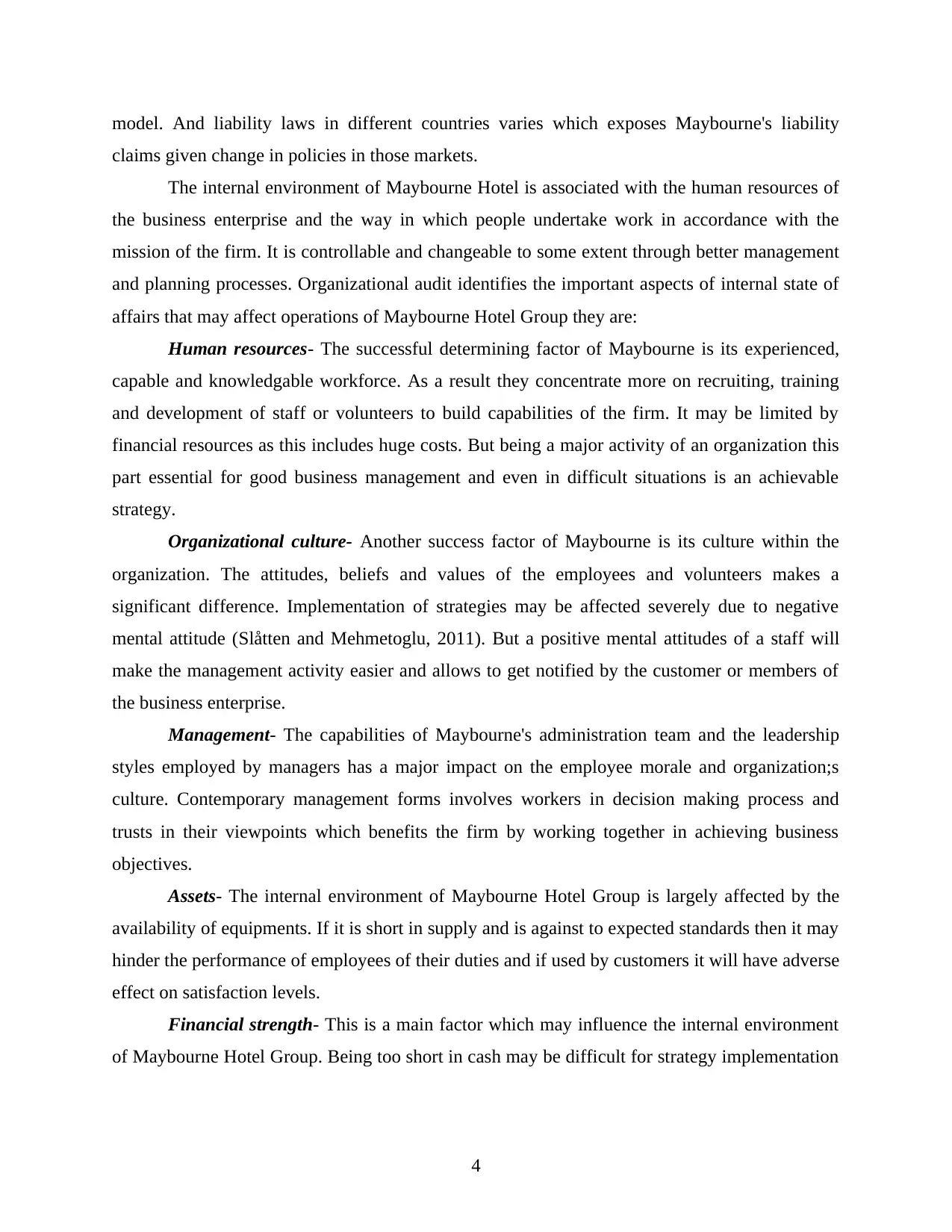
model. And liability laws in different countries varies which exposes Maybourne's liability
claims given change in policies in those markets.
The internal environment of Maybourne Hotel is associated with the human resources of
the business enterprise and the way in which people undertake work in accordance with the
mission of the firm. It is controllable and changeable to some extent through better management
and planning processes. Organizational audit identifies the important aspects of internal state of
affairs that may affect operations of Maybourne Hotel Group they are:
Human resources- The successful determining factor of Maybourne is its experienced,
capable and knowledgable workforce. As a result they concentrate more on recruiting, training
and development of staff or volunteers to build capabilities of the firm. It may be limited by
financial resources as this includes huge costs. But being a major activity of an organization this
part essential for good business management and even in difficult situations is an achievable
strategy.
Organizational culture- Another success factor of Maybourne is its culture within the
organization. The attitudes, beliefs and values of the employees and volunteers makes a
significant difference. Implementation of strategies may be affected severely due to negative
mental attitude (Slåtten and Mehmetoglu, 2011). But a positive mental attitudes of a staff will
make the management activity easier and allows to get notified by the customer or members of
the business enterprise.
Management- The capabilities of Maybourne's administration team and the leadership
styles employed by managers has a major impact on the employee morale and organization;s
culture. Contemporary management forms involves workers in decision making process and
trusts in their viewpoints which benefits the firm by working together in achieving business
objectives.
Assets- The internal environment of Maybourne Hotel Group is largely affected by the
availability of equipments. If it is short in supply and is against to expected standards then it may
hinder the performance of employees of their duties and if used by customers it will have adverse
effect on satisfaction levels.
Financial strength- This is a main factor which may influence the internal environment
of Maybourne Hotel Group. Being too short in cash may be difficult for strategy implementation
4
claims given change in policies in those markets.
The internal environment of Maybourne Hotel is associated with the human resources of
the business enterprise and the way in which people undertake work in accordance with the
mission of the firm. It is controllable and changeable to some extent through better management
and planning processes. Organizational audit identifies the important aspects of internal state of
affairs that may affect operations of Maybourne Hotel Group they are:
Human resources- The successful determining factor of Maybourne is its experienced,
capable and knowledgable workforce. As a result they concentrate more on recruiting, training
and development of staff or volunteers to build capabilities of the firm. It may be limited by
financial resources as this includes huge costs. But being a major activity of an organization this
part essential for good business management and even in difficult situations is an achievable
strategy.
Organizational culture- Another success factor of Maybourne is its culture within the
organization. The attitudes, beliefs and values of the employees and volunteers makes a
significant difference. Implementation of strategies may be affected severely due to negative
mental attitude (Slåtten and Mehmetoglu, 2011). But a positive mental attitudes of a staff will
make the management activity easier and allows to get notified by the customer or members of
the business enterprise.
Management- The capabilities of Maybourne's administration team and the leadership
styles employed by managers has a major impact on the employee morale and organization;s
culture. Contemporary management forms involves workers in decision making process and
trusts in their viewpoints which benefits the firm by working together in achieving business
objectives.
Assets- The internal environment of Maybourne Hotel Group is largely affected by the
availability of equipments. If it is short in supply and is against to expected standards then it may
hinder the performance of employees of their duties and if used by customers it will have adverse
effect on satisfaction levels.
Financial strength- This is a main factor which may influence the internal environment
of Maybourne Hotel Group. Being too short in cash may be difficult for strategy implementation
4
⊘ This is a preview!⊘
Do you want full access?
Subscribe today to unlock all pages.

Trusted by 1+ million students worldwide
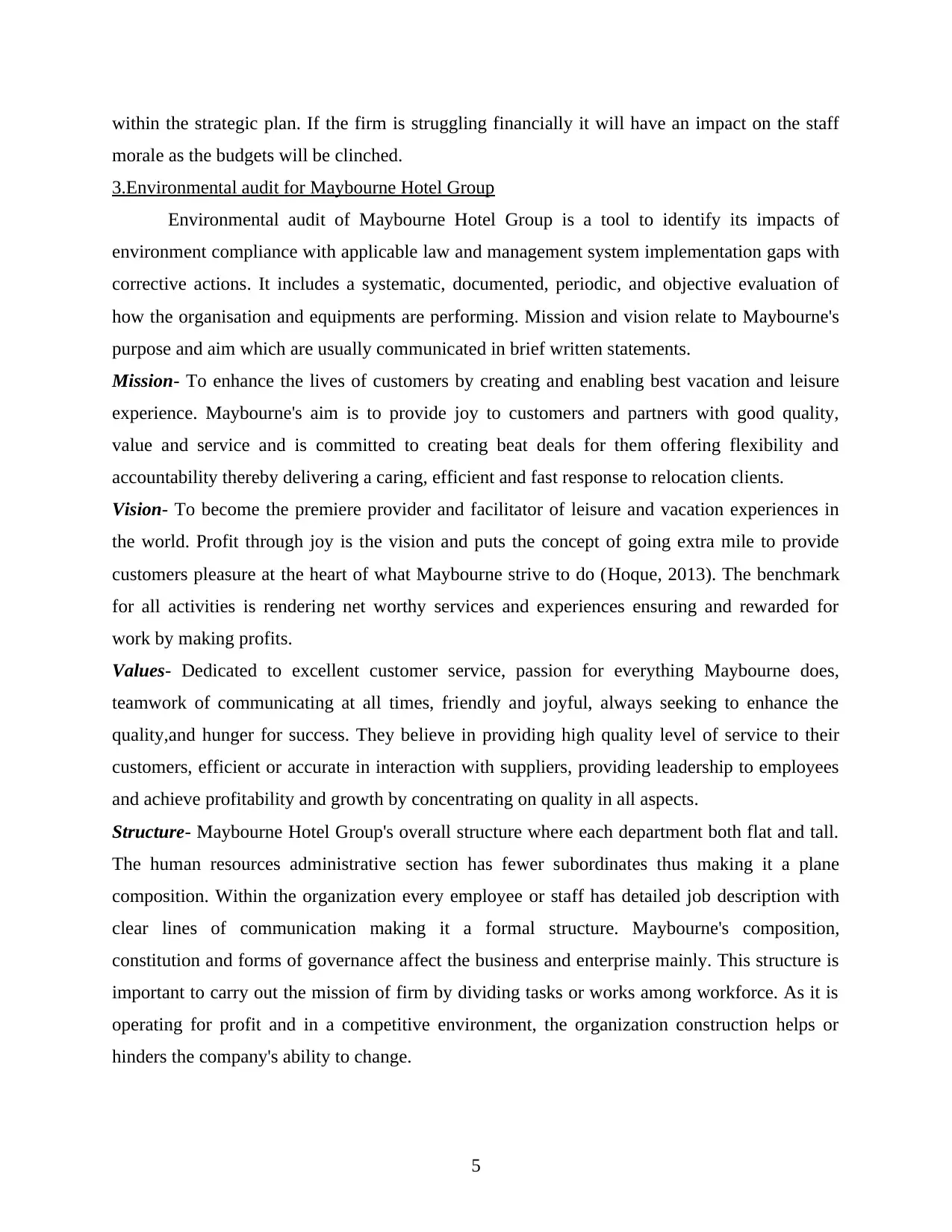
within the strategic plan. If the firm is struggling financially it will have an impact on the staff
morale as the budgets will be clinched.
3.Environmental audit for Maybourne Hotel Group
Environmental audit of Maybourne Hotel Group is a tool to identify its impacts of
environment compliance with applicable law and management system implementation gaps with
corrective actions. It includes a systematic, documented, periodic, and objective evaluation of
how the organisation and equipments are performing. Mission and vision relate to Maybourne's
purpose and aim which are usually communicated in brief written statements.
Mission- To enhance the lives of customers by creating and enabling best vacation and leisure
experience. Maybourne's aim is to provide joy to customers and partners with good quality,
value and service and is committed to creating beat deals for them offering flexibility and
accountability thereby delivering a caring, efficient and fast response to relocation clients.
Vision- To become the premiere provider and facilitator of leisure and vacation experiences in
the world. Profit through joy is the vision and puts the concept of going extra mile to provide
customers pleasure at the heart of what Maybourne strive to do (Hoque, 2013). The benchmark
for all activities is rendering net worthy services and experiences ensuring and rewarded for
work by making profits.
Values- Dedicated to excellent customer service, passion for everything Maybourne does,
teamwork of communicating at all times, friendly and joyful, always seeking to enhance the
quality,and hunger for success. They believe in providing high quality level of service to their
customers, efficient or accurate in interaction with suppliers, providing leadership to employees
and achieve profitability and growth by concentrating on quality in all aspects.
Structure- Maybourne Hotel Group's overall structure where each department both flat and tall.
The human resources administrative section has fewer subordinates thus making it a plane
composition. Within the organization every employee or staff has detailed job description with
clear lines of communication making it a formal structure. Maybourne's composition,
constitution and forms of governance affect the business and enterprise mainly. This structure is
important to carry out the mission of firm by dividing tasks or works among workforce. As it is
operating for profit and in a competitive environment, the organization construction helps or
hinders the company's ability to change.
5
morale as the budgets will be clinched.
3.Environmental audit for Maybourne Hotel Group
Environmental audit of Maybourne Hotel Group is a tool to identify its impacts of
environment compliance with applicable law and management system implementation gaps with
corrective actions. It includes a systematic, documented, periodic, and objective evaluation of
how the organisation and equipments are performing. Mission and vision relate to Maybourne's
purpose and aim which are usually communicated in brief written statements.
Mission- To enhance the lives of customers by creating and enabling best vacation and leisure
experience. Maybourne's aim is to provide joy to customers and partners with good quality,
value and service and is committed to creating beat deals for them offering flexibility and
accountability thereby delivering a caring, efficient and fast response to relocation clients.
Vision- To become the premiere provider and facilitator of leisure and vacation experiences in
the world. Profit through joy is the vision and puts the concept of going extra mile to provide
customers pleasure at the heart of what Maybourne strive to do (Hoque, 2013). The benchmark
for all activities is rendering net worthy services and experiences ensuring and rewarded for
work by making profits.
Values- Dedicated to excellent customer service, passion for everything Maybourne does,
teamwork of communicating at all times, friendly and joyful, always seeking to enhance the
quality,and hunger for success. They believe in providing high quality level of service to their
customers, efficient or accurate in interaction with suppliers, providing leadership to employees
and achieve profitability and growth by concentrating on quality in all aspects.
Structure- Maybourne Hotel Group's overall structure where each department both flat and tall.
The human resources administrative section has fewer subordinates thus making it a plane
composition. Within the organization every employee or staff has detailed job description with
clear lines of communication making it a formal structure. Maybourne's composition,
constitution and forms of governance affect the business and enterprise mainly. This structure is
important to carry out the mission of firm by dividing tasks or works among workforce. As it is
operating for profit and in a competitive environment, the organization construction helps or
hinders the company's ability to change.
5
Paraphrase This Document
Need a fresh take? Get an instant paraphrase of this document with our AI Paraphraser
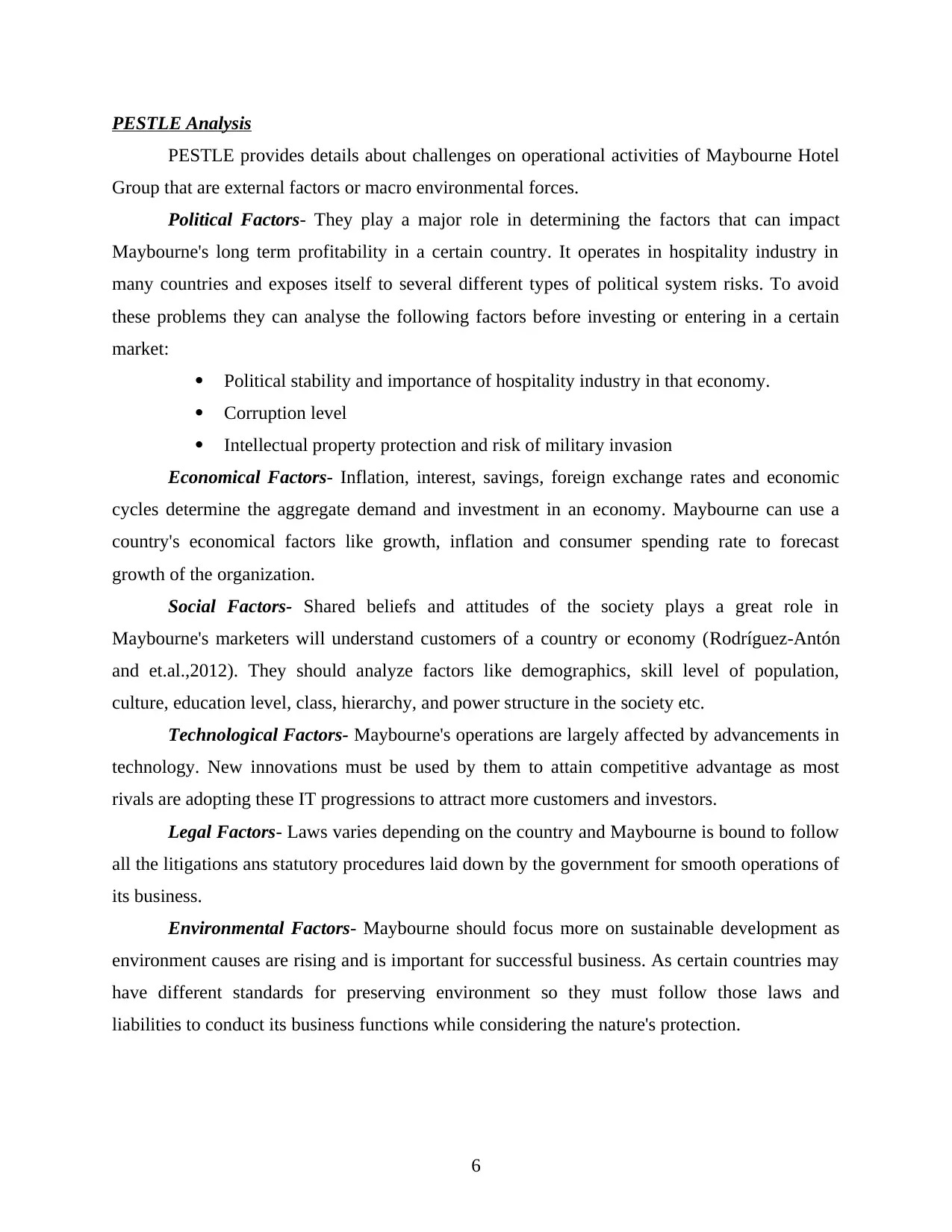
PESTLE Analysis
PESTLE provides details about challenges on operational activities of Maybourne Hotel
Group that are external factors or macro environmental forces.
Political Factors- They play a major role in determining the factors that can impact
Maybourne's long term profitability in a certain country. It operates in hospitality industry in
many countries and exposes itself to several different types of political system risks. To avoid
these problems they can analyse the following factors before investing or entering in a certain
market:
Political stability and importance of hospitality industry in that economy.
Corruption level
Intellectual property protection and risk of military invasion
Economical Factors- Inflation, interest, savings, foreign exchange rates and economic
cycles determine the aggregate demand and investment in an economy. Maybourne can use a
country's economical factors like growth, inflation and consumer spending rate to forecast
growth of the organization.
Social Factors- Shared beliefs and attitudes of the society plays a great role in
Maybourne's marketers will understand customers of a country or economy (Rodríguez-Antón
and et.al.,2012). They should analyze factors like demographics, skill level of population,
culture, education level, class, hierarchy, and power structure in the society etc.
Technological Factors- Maybourne's operations are largely affected by advancements in
technology. New innovations must be used by them to attain competitive advantage as most
rivals are adopting these IT progressions to attract more customers and investors.
Legal Factors- Laws varies depending on the country and Maybourne is bound to follow
all the litigations ans statutory procedures laid down by the government for smooth operations of
its business.
Environmental Factors- Maybourne should focus more on sustainable development as
environment causes are rising and is important for successful business. As certain countries may
have different standards for preserving environment so they must follow those laws and
liabilities to conduct its business functions while considering the nature's protection.
6
PESTLE provides details about challenges on operational activities of Maybourne Hotel
Group that are external factors or macro environmental forces.
Political Factors- They play a major role in determining the factors that can impact
Maybourne's long term profitability in a certain country. It operates in hospitality industry in
many countries and exposes itself to several different types of political system risks. To avoid
these problems they can analyse the following factors before investing or entering in a certain
market:
Political stability and importance of hospitality industry in that economy.
Corruption level
Intellectual property protection and risk of military invasion
Economical Factors- Inflation, interest, savings, foreign exchange rates and economic
cycles determine the aggregate demand and investment in an economy. Maybourne can use a
country's economical factors like growth, inflation and consumer spending rate to forecast
growth of the organization.
Social Factors- Shared beliefs and attitudes of the society plays a great role in
Maybourne's marketers will understand customers of a country or economy (Rodríguez-Antón
and et.al.,2012). They should analyze factors like demographics, skill level of population,
culture, education level, class, hierarchy, and power structure in the society etc.
Technological Factors- Maybourne's operations are largely affected by advancements in
technology. New innovations must be used by them to attain competitive advantage as most
rivals are adopting these IT progressions to attract more customers and investors.
Legal Factors- Laws varies depending on the country and Maybourne is bound to follow
all the litigations ans statutory procedures laid down by the government for smooth operations of
its business.
Environmental Factors- Maybourne should focus more on sustainable development as
environment causes are rising and is important for successful business. As certain countries may
have different standards for preserving environment so they must follow those laws and
liabilities to conduct its business functions while considering the nature's protection.
6
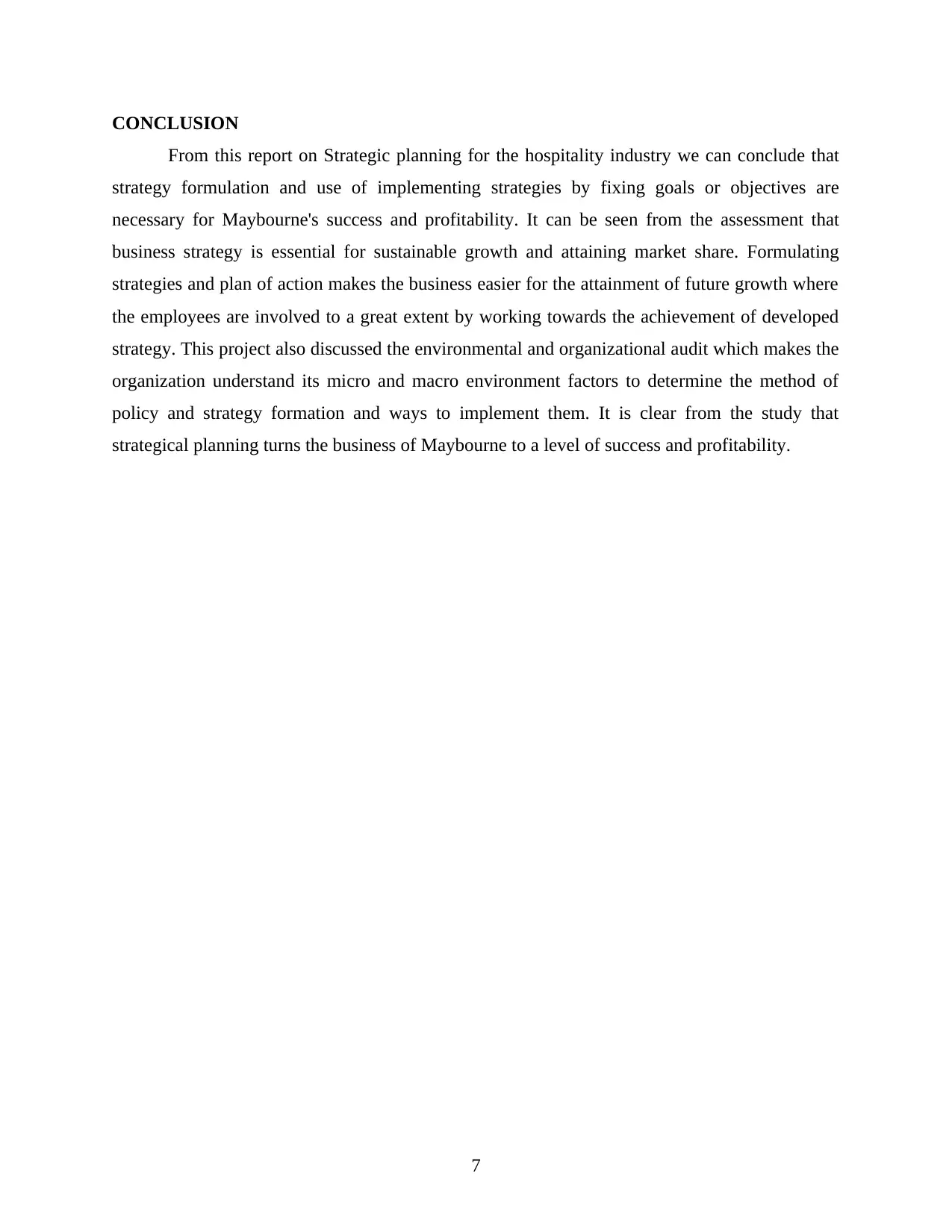
CONCLUSION
From this report on Strategic planning for the hospitality industry we can conclude that
strategy formulation and use of implementing strategies by fixing goals or objectives are
necessary for Maybourne's success and profitability. It can be seen from the assessment that
business strategy is essential for sustainable growth and attaining market share. Formulating
strategies and plan of action makes the business easier for the attainment of future growth where
the employees are involved to a great extent by working towards the achievement of developed
strategy. This project also discussed the environmental and organizational audit which makes the
organization understand its micro and macro environment factors to determine the method of
policy and strategy formation and ways to implement them. It is clear from the study that
strategical planning turns the business of Maybourne to a level of success and profitability.
7
From this report on Strategic planning for the hospitality industry we can conclude that
strategy formulation and use of implementing strategies by fixing goals or objectives are
necessary for Maybourne's success and profitability. It can be seen from the assessment that
business strategy is essential for sustainable growth and attaining market share. Formulating
strategies and plan of action makes the business easier for the attainment of future growth where
the employees are involved to a great extent by working towards the achievement of developed
strategy. This project also discussed the environmental and organizational audit which makes the
organization understand its micro and macro environment factors to determine the method of
policy and strategy formation and ways to implement them. It is clear from the study that
strategical planning turns the business of Maybourne to a level of success and profitability.
7
⊘ This is a preview!⊘
Do you want full access?
Subscribe today to unlock all pages.

Trusted by 1+ million students worldwide
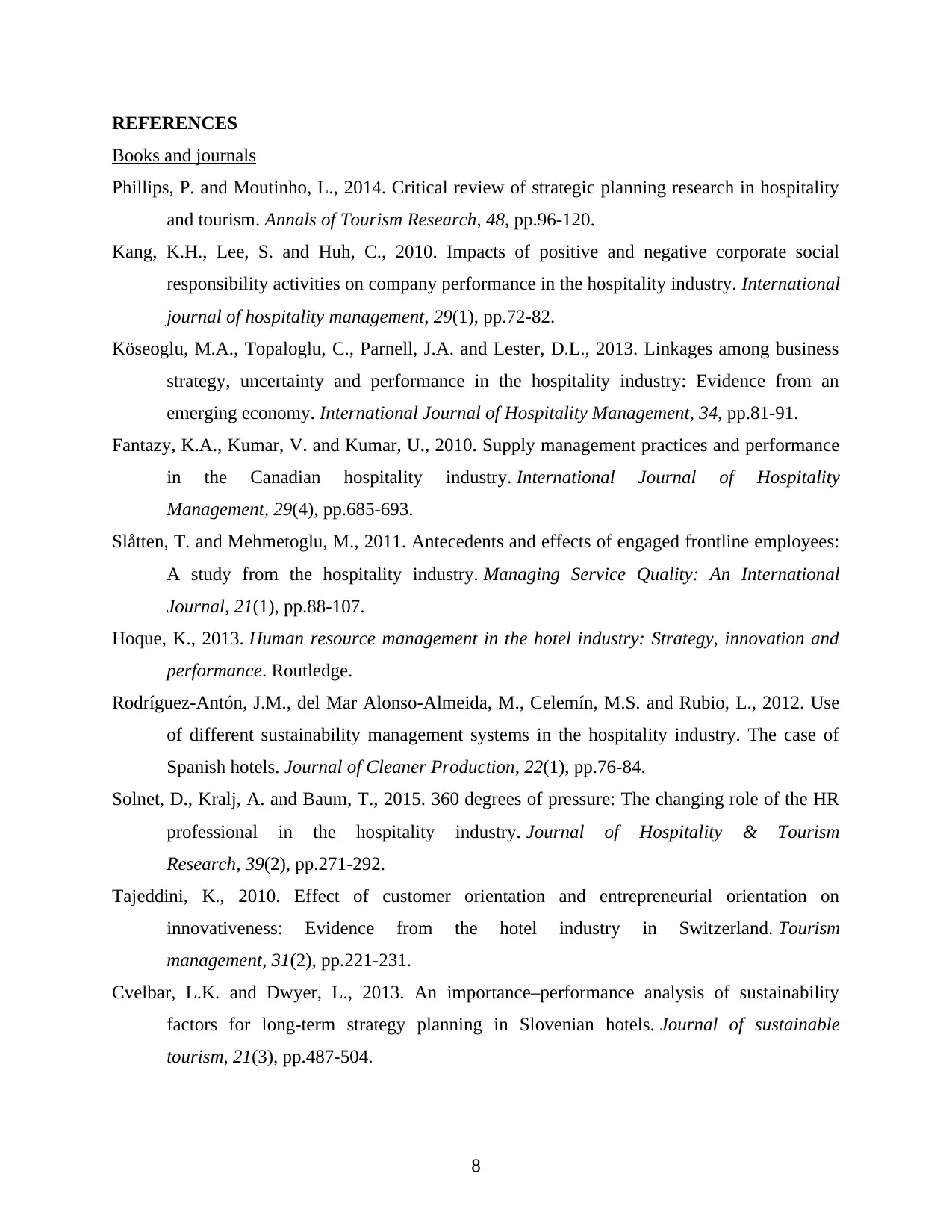
REFERENCES
Books and journals
Phillips, P. and Moutinho, L., 2014. Critical review of strategic planning research in hospitality
and tourism. Annals of Tourism Research, 48, pp.96-120.
Kang, K.H., Lee, S. and Huh, C., 2010. Impacts of positive and negative corporate social
responsibility activities on company performance in the hospitality industry. International
journal of hospitality management, 29(1), pp.72-82.
Köseoglu, M.A., Topaloglu, C., Parnell, J.A. and Lester, D.L., 2013. Linkages among business
strategy, uncertainty and performance in the hospitality industry: Evidence from an
emerging economy. International Journal of Hospitality Management, 34, pp.81-91.
Fantazy, K.A., Kumar, V. and Kumar, U., 2010. Supply management practices and performance
in the Canadian hospitality industry. International Journal of Hospitality
Management, 29(4), pp.685-693.
Slåtten, T. and Mehmetoglu, M., 2011. Antecedents and effects of engaged frontline employees:
A study from the hospitality industry. Managing Service Quality: An International
Journal, 21(1), pp.88-107.
Hoque, K., 2013. Human resource management in the hotel industry: Strategy, innovation and
performance. Routledge.
Rodríguez-Antón, J.M., del Mar Alonso-Almeida, M., Celemín, M.S. and Rubio, L., 2012. Use
of different sustainability management systems in the hospitality industry. The case of
Spanish hotels. Journal of Cleaner Production, 22(1), pp.76-84.
Solnet, D., Kralj, A. and Baum, T., 2015. 360 degrees of pressure: The changing role of the HR
professional in the hospitality industry. Journal of Hospitality & Tourism
Research, 39(2), pp.271-292.
Tajeddini, K., 2010. Effect of customer orientation and entrepreneurial orientation on
innovativeness: Evidence from the hotel industry in Switzerland. Tourism
management, 31(2), pp.221-231.
Cvelbar, L.K. and Dwyer, L., 2013. An importance–performance analysis of sustainability
factors for long-term strategy planning in Slovenian hotels. Journal of sustainable
tourism, 21(3), pp.487-504.
8
Books and journals
Phillips, P. and Moutinho, L., 2014. Critical review of strategic planning research in hospitality
and tourism. Annals of Tourism Research, 48, pp.96-120.
Kang, K.H., Lee, S. and Huh, C., 2010. Impacts of positive and negative corporate social
responsibility activities on company performance in the hospitality industry. International
journal of hospitality management, 29(1), pp.72-82.
Köseoglu, M.A., Topaloglu, C., Parnell, J.A. and Lester, D.L., 2013. Linkages among business
strategy, uncertainty and performance in the hospitality industry: Evidence from an
emerging economy. International Journal of Hospitality Management, 34, pp.81-91.
Fantazy, K.A., Kumar, V. and Kumar, U., 2010. Supply management practices and performance
in the Canadian hospitality industry. International Journal of Hospitality
Management, 29(4), pp.685-693.
Slåtten, T. and Mehmetoglu, M., 2011. Antecedents and effects of engaged frontline employees:
A study from the hospitality industry. Managing Service Quality: An International
Journal, 21(1), pp.88-107.
Hoque, K., 2013. Human resource management in the hotel industry: Strategy, innovation and
performance. Routledge.
Rodríguez-Antón, J.M., del Mar Alonso-Almeida, M., Celemín, M.S. and Rubio, L., 2012. Use
of different sustainability management systems in the hospitality industry. The case of
Spanish hotels. Journal of Cleaner Production, 22(1), pp.76-84.
Solnet, D., Kralj, A. and Baum, T., 2015. 360 degrees of pressure: The changing role of the HR
professional in the hospitality industry. Journal of Hospitality & Tourism
Research, 39(2), pp.271-292.
Tajeddini, K., 2010. Effect of customer orientation and entrepreneurial orientation on
innovativeness: Evidence from the hotel industry in Switzerland. Tourism
management, 31(2), pp.221-231.
Cvelbar, L.K. and Dwyer, L., 2013. An importance–performance analysis of sustainability
factors for long-term strategy planning in Slovenian hotels. Journal of sustainable
tourism, 21(3), pp.487-504.
8
1 out of 10
Related Documents
Your All-in-One AI-Powered Toolkit for Academic Success.
+13062052269
info@desklib.com
Available 24*7 on WhatsApp / Email
![[object Object]](/_next/static/media/star-bottom.7253800d.svg)
Unlock your academic potential
Copyright © 2020–2026 A2Z Services. All Rights Reserved. Developed and managed by ZUCOL.





